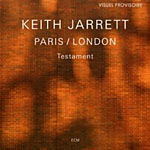Home » Jazz Articles » Multiple Reviews » Keith Jarrett: Trio, Solo & Duo
Keith Jarrett: Trio, Solo & Duo
 |  |  |
Keith Jarrett Standards in Sweden I & II Blue Music Group 2010 | Keith Jarrett Paris/London: Testament ECM 2009 | Keith Jarrett Jasmine ECM 2010 |
Though one of the most lyrically gifted pianists of his generation, Keith Jarrett has been one of the players that jazz fans either love or hate. Predominately heard with his working trio, bassist Gary Peacock and drummer Jack DeJohnette, Jarrett still enjoys playing totally improvised solo concerts while hearing him in duo with bassist Charlie Haden is a bit of novelty, as it has been decades since they played together.
Jarrett has long been a fixture on the ECM label, so the appearance of a two-CD set from his 1989 European tour on Blue Music Group is a bit of a surprise. This Stockholm concert with Peacock and DeJohnette compares favorably to earlier ECM CDs recorded during the tour, with ESP-like chemistry throughout the performance between the trio while the superb engineering makes the listener feel as if he is seated on stage with the musicians.
Jarrett opts for a bright setting of "Lover Man" and the influence of Bill Evans is apparent in his breezy setting of "The Way You Look Tonight." The pianist opens "The Ballad of the Sad Young Men" with a hymn-like reverence, with Peacock adding a prominent contrasting line and DeJohnette subdued brushwork. Jarrett sets up "My Man's Gone Now" with an unusual tense, march-like rhythm, taking this dramatic ballad in a very new direction. There's nothing fancy about his rendition of "When I Fall in Love"; it's simply a masterful take on a timeless ballad.
Jarrett's surprising opener for the second disc is Alec Wilder's infrequently heard "The Wrong Blues," a piece which demonstrates the interactivity of the trio. Jarrett's up-tempo solo introduction to "All the Things You Are" focuses on his complex Latin bass line, the addition of the rhythm section continuing to fan the flames in a breath-taking performance.
ECM is known for its sparse packaging without liner notes, but producer Manfred Eicher made an exception for Jarrett's three-disc concert set Paris/London: Testament. The pianist explains in great detail about how he began improvising as a young student, even including at least one improvisation during his classical recitals. This grew into improvising in total during his solo piano jazz concerts, with the individual sections flowing naturally from one to the next, lasting 45 minutes or more, often with no more than three distinct sections. But he burned out on this approach and gave it up for a number of years until a return to this format earlier in this decade. He made one significant change in this context, now being willing to wrap an improvisation immediately if he found himself on familiar ground.
Jarrett's Paris concert at the Salle Pleyel is contained on a single disc. The opener is a turbulent affair, which begins with an intense dramatic section then shifts to a slow meditative motif. The third piece bustles with hope, as if the pianist has awakened to a new day. The seventh improvisation has a hymn-like air while the long finale is a rapid-fire piece that could easily be mistaken for a modern classical composition.
The Royal Festival Hall concert has 12 separate sections, which sound like they have a logical flow in the form of an extended suite, even though the audience response is often extended between selections and they easily stand on their individual merits. Unlike some of his earlier improvised concerts, there is never a feeling of a holding pattern as he seeks a new path. The opening track is played pianissimo with a brooding sense of despair. The second piece is full of conflict and turmoil, with numerous grunts by the pianist. The reverent sixth section displays a ray of hope in a majestic ballad setting. The opening of the second disc begins with a brooding theme utilizing an ostinato bass line. Other highlights include the meditative pastoral piece, a frenetic miniature that might have been perfect for part of a film soundtrack, along with the finale, which has an upbeat, down home-flavored theme. Regardless of one's feelings about any of Jarrett's previous solo piano concerts, this collection is for the ages.
Jarrett and Haden played together in the American Quartet, which included Dewey Redman and Paul Motian, producing memorable music before dissolving in 1976. In 2007, Jarrett was asked to take part in a Haden documentary. A few months later, Jarrett decided to invite Haden to join him in his home studio, where they recorded over the next four days. Jarrett chose eight of their performances for Jasmine.
Although it had been a long time since they last recorded together, they rekindled their past magic for these lyrical sessions, which focuses mostly on standards and ballads, resulting in a low-key but never-dull affair. The subdued, melodic opener is "For All We Know," with Jarrett gracefully embellishing the melody and Haden's deliberate, spacious bass line providing the perfect backing. There's nothing the least bit clichéd in their interpretation of the bittersweet ballad "Goodbye"; they put their own stamp upon it without losing its essence or emotional impact. Jarrett improvises a solo introduction to "I'm Gonna Laugh You Right Out of My Life," with Haden joining him as the theme emerges, the latter playing with a bit brighter sound on this selection.
Jarrett and Haden also chose some less common songs. "Where Can I Go Without You" is usually associated with vocalists but this Victor Young melody, even without Peggy Lee's lyrics, has plenty of possibilities, as the duo discover with their heartfelt treatment. Joe Sample's somber "One Day I'll Fly Away" hasn't been recorded that often in a straight-ahead jazz setting, but the duo deliver a beautifully understated performance of this moving ballad. With its lyrical mood and lack of pyrotechnics, Jasmine is perfect for late night listening.
Tracks and Personnel
Standards in Sweden I & II
Tracks: Lover Man; The Way You Look Tonight; The Ballad of the Sad Young Man; My Man's Gone Now; When I Fall in Love; The Wrong Blues; All the Things You Are; I Fall in Love Too Easily; Sweet and Lovely; Solar.
Personnel: Keith Jarrett: piano; Gary Peacock: bass; Jack DeJohnette: drums.
Paris/London: Testament
Tracks: Part I—Salle Pleyel, Paris; Part II—Salle Pleyel, Paris; Part III—Salle Pleyel, Paris; Part IV—Salle Pleyel, Paris; Part V—Salle Pleyel, Paris; Part VI—Salle Pleyel, Paris; Part VII—Salle Pleyel, Paris; Part VIII— Salle Pleyel, Paris; Part I—Royal Festival Hall, London; Part II—Royal Festival Hall, London; Part III—Royal Festival Hall, London; Part IV—Royal Festival Hall, London; Part V—Royal Festival Hall, London; Part VI— Royal Festival Hall, London; Part VII—Royal Festival Hall, London; Part VIII—Royal Festival Hall, London; Part IX—Royal Festival Hall, London; Part X—Royal Festival Hall, London; Part XI—Royal Festival Hall, London; Part XII—Royal Festival Hall, London.
Personnel: Keith Jarrett: piano.
Jasmine
Tracks: For All We Know; Where Can I Go Without You; No Moon at All; One Day I'll Fly Away; Intro—I'm Gonna Laugh You Right Out Of My Life; Body And Soul; Goodbye; Don't Ever Leave Me.
Personnel: Keith Jarrett: piano; Charlie Haden: bass.
< Previous
Geri Allen: Solo and Quartet
Comments
Tags
Concerts
For the Love of Jazz
 All About Jazz has been a pillar of jazz since 1995, championing it as an art form and, more importantly, supporting the musicians who create it. Our enduring commitment has made "AAJ" one of the most culturally important websites of its kind, read by hundreds of thousands of fans, musicians and industry figures every month.
All About Jazz has been a pillar of jazz since 1995, championing it as an art form and, more importantly, supporting the musicians who create it. Our enduring commitment has made "AAJ" one of the most culturally important websites of its kind, read by hundreds of thousands of fans, musicians and industry figures every month.




















